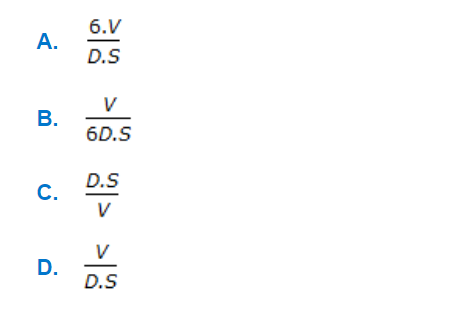Question

a.
A
b.
B
c.
C
d.
D
Posted under Basic Chemical Engineering
Interact with the Community - Share Your Thoughts
Uncertain About the Answer? Seek Clarification Here.
Understand the Explanation? Include it Here.
Q. Sphericity for a non-spherical particle is given by (where, V and S are volume and surface area respectively of one particle. and, D = equivalent diameter of particle).
Similar Questions
Explore Relevant Multiple Choice Questions (MCQs)
Q. What is the reduction ratio in a fine crushing operation having following feed and product sizes?
View solution
Q. The value of 'angle of nip' is generally about
View solution
Q. Size reduction of the __________ can be suitably done by ball mills, crushing rolls and rod mills.
View solution
Q. Sulphuric acid mist is arrested by using a __________ scrubber.
View solution
Q. The main size reduction operation in ultrafine grinders is
View solution
Q. In case of a hammer crusher,
View solution
Q. The energy required per unit mass to grind limestone particles of very large size to 100 μm is 12.7 kWh/ton. An estimate (using Bond's law) of the energy to grind the particles from a very large size to 50 μrn is
View solution
Q. Which of the following is the most suitable for cleaning of fine coal dust (<0.5 mm) ?
View solution
Q. Pick out the correct statement:
View solution
Q. Range of compressibility co-efficient of the commercial compressible cake obtained in filtration operation is
View solution
Q. Highly viscous liquids & pastes are agitated by
View solution
Q. Short distance transportation of grain, gravel, sand, ash, asphalt etc. is done by using a __________ conveyor.
View solution
Q. Equivalent diameter of a particle is the diameter of the sphere having the same
View solution
Q. If dₚ is the equivalent diameter of a non-spherical particle, Vₚ its volume and sₚ its surface area, then its sphericity is Φₛ is defined by
View solution
Q. Power required to drive a ball mill with a particular ball load is proportional to (where, D = diameter of ball mill )
View solution
Q. Pick out the wrong statement.
View solution
Q. The distribution given by microscopic analysis of powder is
View solution
Q. Number of particles in a crushed solid sample is given by (where, m = mass of particles in a sample, Vₚ = volume of one particle, ρ= density of particles)
View solution
Q. For a non-spherical particle, the sphericity
View solution
Q. In washing type plate and frame filter press, the ratio of washing rate to the final filtrate rate is
View solution
Recommended Subjects
Are you eager to expand your knowledge beyond Basic Chemical Engineering? We've handpicked a range of related categories that you might find intriguing.
Click on the categories below to discover a wealth of MCQs and enrich your understanding of various subjects. Happy exploring!








